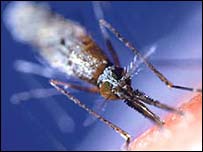
The malaria parasite is spread by
mosquitoes |
Malaria
parasites develop in the lymph nodes of the immune system,
researchers have discovered.
Scientists say the finding was unexpected, and underlines just
how complex malaria infection can be.
The immature parasites are known to travel to an infected
person's liver, which, until now, scientists thought was the only
place they could develop.
The study, by Pasteur Institute in Paris, features online in the
journal Nature Medicine.
 |
LYMPH NODES
Small bean-sized organs made up of densely
packed lymphocyte cells
Clusters are widely distributed in the
body
Essential to the functioning of the immune
system
The main sites where immune responses are
launched |
The researchers hope their work could aid the development of
better vaccines, which might potentially target the parasites before
they develop in the liver.
The researchers infected mosquitoes with fluorescently tagged
Plasmodium parasites, and then allowed the mosquitoes to bite a
mouse.
From each mosquito bite, they found an average of 20 fluorescent
parasites embedded in the animal's skin.
Path followed
The parasites were found to move through the skin at high speed
in a random, circuitous path.
After leaving the skin, the parasites frequently invaded blood
vessels.
This was no surprise as they need to travel through blood vessels
to get to the liver.
However, about 25% of the parasites invaded lymphatic vessels of
the immune system, ending up in the lymph nodes close to the site of
the bite.
Their journey seemed to stop there, as the malaria parasites
almost never appeared in lymph nodes farther away.
Within about four hours of the mosquito bite, many of the
lymph-node parasites appeared degraded.
They were also seen interacting with key mammalian immune cells,
suggesting that the immune cells were destroying them.
A small number of the parasites in the lymph nodes, however,
escaped degradation and began to develop into forms usually found
only in the liver.
By 52 hours after the mosquito bites, no parasites remained in
the lymph nodes, which suggests that they cannot develop completely
there.
Immune influence
Lead researcher Dr Robert Ménard said only fully developed
parasites can infect red blood cells and cause malaria - so the
lymph-node parasites probably do not contribute to the appearance of
malaria symptoms.
However, he said even partially developed or destroyed parasites
could significantly affect how the immune system responds to
infection.
Parasites developing in the lymph nodes might alert the body that
an invader is present, and activate a protective immune response.
Alternatively, their presence might desensitise the body to the
parasites, blunting the immune system's response to infection.
The researchers were also surprised to find that some of the
parasites remained in the animals' skin for up to seven hours,
raising the possibility that they might be responsible for a second
wave of infection.
Professor Brian Greenwood, of the London School of Hygiene and
Tropical Medicine, agreed that the study would help scientists
better to understand the immune response to malaria.
He said it had previously been thought that infection levels at
the time when a mosquito bites were too small to trigger an immune
response, which only came once the parasites started multiplying in
the liver.